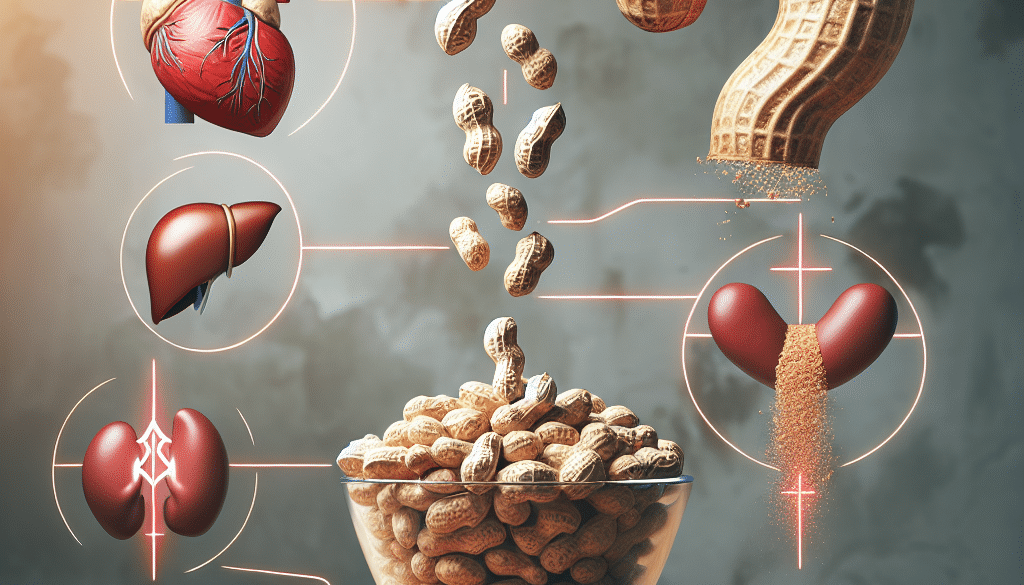Are Too Many Peanuts Bad For You?
-
Table of Contents
- Peanuts: How Much is Too Much for Your Health?
- The Nutritional Profile of Peanuts
- Potential Risks of Excessive Peanut Consumption
- How Many Peanuts Should You Eat?
- Case Studies and Research Findings
- Striking the Right Balance
- Conclusion: Moderation is Key
- Discover ETprotein’s Range of Protein Products
Peanuts: How Much is Too Much for Your Health?

Peanuts are a staple in many diets around the world, known for their rich flavor and nutritional benefits. They are a good source of protein, healthy fats, vitamins, and minerals. However, as with any food, moderation is key. Consuming too many peanuts can lead to health issues, despite their nutritional value. In this article, we will explore the potential risks of overindulging in peanuts and provide insights into how to enjoy them as part of a balanced diet.
The Nutritional Profile of Peanuts
Peanuts are not only delicious but also packed with essential nutrients. Here’s what makes them a healthy addition to your diet:
- Protein: Peanuts are a good source of plant-based protein, which is essential for muscle repair and growth.
- Healthy fats: They contain monounsaturated and polyunsaturated fats, which can help lower bad cholesterol levels.
- Fiber: Peanuts are high in dietary fiber, which aids in digestion and promotes a feeling of fullness.
- Vitamins and minerals: They are rich in vitamins E and B complex, magnesium, phosphorus, and potassium.
- Antioxidants: Peanuts contain resveratrol, coumaric acid, and other antioxidants that help protect the body from oxidative stress.
Potential Risks of Excessive Peanut Consumption
Despite their health benefits, there are several reasons why you might want to limit your peanut intake:
- Allergies: Peanuts are one of the most common allergens, and allergic reactions can be severe and even life-threatening.
- Caloric Density: Peanuts are high in calories, and overeating can lead to weight gain.
- Aflatoxins: Peanuts can be contaminated with aflatoxins, which are toxic substances produced by certain molds. High levels of aflatoxin exposure can lead to liver damage and cancer.
- Anti-nutrients: Peanuts contain phytic acid, which can bind to minerals and reduce their absorption.
How Many Peanuts Should You Eat?
The recommended serving size for peanuts is about one ounce (28 grams), which equates to roughly a small handful. This serving size provides a good balance of nutrients without contributing excessive calories to your diet. It’s also important to consider the form in which you consume peanuts. Raw or dry-roasted peanuts without added salt or sugar are the healthiest options.
Case Studies and Research Findings
Several studies have investigated the effects of peanut consumption on health. For instance, research published in the “Journal of Nutrition” found that moderate peanut consumption could reduce the risk of heart disease. Another study in the “British Journal of Nutrition” linked peanut consumption to a lower risk of diabetes.
However, these benefits are associated with moderate consumption. Excessive intake can negate these positive effects and lead to health issues such as weight gain and increased risk of aflatoxin exposure.
Striking the Right Balance
To enjoy peanuts without overdoing it, consider the following tips:
- Measure your portions to avoid mindless snacking.
- Choose unsalted and unflavored varieties to minimize sodium and sugar intake.
- Include peanuts as part of a varied diet rich in fruits, vegetables, whole grains, and lean proteins.
- Be mindful of peanut butter consumption, as it’s easy to exceed recommended serving sizes.
Conclusion: Moderation is Key
In conclusion, peanuts can be a nutritious part of your diet when consumed in moderation. They offer a variety of health benefits but can also pose risks if eaten in excess. By being mindful of portion sizes and choosing healthier varieties, you can enjoy peanuts without compromising your health.
Discover ETprotein’s Range of Protein Products
If you’re looking for alternative protein sources to complement your diet, ETprotein offers a wide range of high-quality protein products. Their selection includes organic rice protein, pea protein, and other plant-based options that are non-GMO and allergen-free. ETprotein’s products are perfect for those seeking to diversify their protein intake while maintaining a balanced and healthy diet.
About ETprotein:
ETprotein, a reputable protein and L-(+)-Ergothioneine (EGT) Chinese factory manufacturer and supplier, is renowned for producing, stocking, exporting, and delivering the highest quality organic bulk vegan proteins and L-(+)-Ergothioneine. They include Organic rice protein, clear rice protein, pea protein, clear pea protein, watermelon seed protein, pumpkin seed protein, sunflower seed protein, mung bean protein, peanut protein, and L-(+)-Ergothioneine EGT Pharmaceutical grade, L-(+)-Ergothioneine EGT food grade, L-(+)-Ergothioneine EGT cosmetic grade, L-(+)-Ergothioneine EGT reference grade and L-(+)-Ergothioneine EGT standard. Their offerings, characterized by a neutral taste, non-GMO, allergen-free attributes, with L-(+)-Ergothioneine purity over 98%, 99%, cater to a diverse range of industries. They serve nutraceutical, pharmaceutical, cosmeceutical, veterinary, as well as food and beverage finished product distributors, traders, and manufacturers across Europe, USA, Canada, Australia, Thailand, Japan, Korea, Brazil, and Chile, among others.
ETprotein specialization includes exporting and delivering tailor-made protein powder and finished nutritional supplements. Their extensive product range covers sectors like Food and Beverage, Sports Nutrition, Weight Management, Dietary Supplements, Health and Wellness Products, and Infant Formula, ensuring comprehensive solutions to meet all your protein needs.
As a trusted company by leading global food and beverage brands and Fortune 500 companies, ETprotein reinforces China’s reputation in the global arena. For more information or to sample their products, please contact them and email sales(at)ETprotein.com today.














